- Home
- Ellen Datlow
Echoes Page 14
Echoes Read online
Page 14
When he saw the place, he stopped. It didn’t make any sense. The whole apartment smelled of mildew and urine. Much of the furniture was damaged, and what wasn’t covered in dust was covered in mold. He sensed that no one had been here in a long time, but he went into the bedroom anyway. It was in the same condition as the living room. The carpet and bare mattress were black with mildew. He checked the dresser and looked in the closet. Both were empty. Nick went back into the living room and looked around for a clue as to where Eleanor might have gone. How could he haunt someone who wasn’t there?
The few papers he found on the floor were either moldy or so damp that the ink had run, making them unreadable. A creak and a loud pop startled him. When he didn’t see anything in the living room he went back to the apartment door. It moved back and forth slightly and it took him a moment to understand why.
Nick stepped on something metallic and picked it up. It was one of the door hinges. The dogs were still trying to batter their way in and while the door itself was thick and strong, all the damp and rot in the apartment had softened the frame around it. The screws in the second hinge were already working their way loose. He was certain that the chair he’d wedged under the doorknob was the only thing keeping the dogs outside. If they got in they’d rip him apart like an old sheet.
Nick knew the apartment and he knew the building and there were no other exits. He’d hated heights in life and the fear hadn’t left him in death. Still, he knew the only way out was the fire escape.
He went back into the bedroom and headed for a broken window by the radiator. Moonlight and a damp mist streamed inside. When he stuck his head out the window to see the way down, he almost laughed. The fire escape was there, but on the ground in a twisted heap where it had collapsed. From the other room, he could hear the second hinge wrenching its way out of the wooden door frame. He looked up wondering if he could climb to the roof. However, the fire escape above him was gone too. Dark shapes streaked across the front of the apartment building. More dogs, attracted to the place by the howls of the pack in the hall. Whatever mad thoughts he had about making a run for it down the stairs vanished.
A piece of glass slid from the window frame and he watched it fall. It didn’t hit the ground. Instead, it landed on a massive pile of garbage in front of the building. The city had cut off most services to the neighborhood long ago, beginning with garbage pick up. It looked as if the building’s residents had simply thrown everything they didn’t want from their windows until they’d created a small mountain. For a moment, Nick wondered what filth lay below him, but he cut off the thought when it became clear to him what he was going to have to do.
From what Nick could see, the trash pile was topped by several filthy mattresses. If what was below them was soft enough, they might absorb his weight enough to catch him. It wasn’t like he was going to die again, but his spectral body healed slowly and the pain was just as acute as it had been in life.
A final pop echoed from the other room and the howling dogs shot into the apartment. Nick stood at the edge of the window and waited until he could feel the dogs right behind him. He needed the fear to let go of the sill and step out into empty air.
The sensation of falling seemed to last less than a second before it was replaced by a feeling that he’d been hit by a bus. Groaning, Nick slowly rolled into a sitting position at the edge of the mattress. He touched his legs and ribs. No pain there, and his limbs seemed to move the way they were supposed to. Nick’s back was another matter. It felt as if he’d pulled and bruised every muscle from his neck down to his ankles. He tried to stand, but the pain made him gasp and he fell back onto a mattress. Above him, the dogs were still barking. When he tried to stand again, hands reached down and pulled him to his feet.
Three young men stood around him in a semicircle.
“Thank you,” Nick said.
“You can stand? You steady on your feet?” said the nearest young man. The one who’d helped him up.
“Yes. I think so.”
Without warning, he punched Nick in the stomach. The pain shot all the way through to his back and he fell to his knees. From this lowered vantage point, he noticed that the young men were all wearing matching jackets. A gang, he thought.
The man who’d punched him prodded him with the toe of his boot. “Give me your wallet,” he said.
Nick shook his head. He said, “I don’t have a wallet. Dead men don’t carry money.”
The young man smiled at his friends. When he turned back to Nick he said, “You’re not dead.”
“That’s your opinion.”
Nick reached into a coat pocket, pulled out a revolver, and shot at the young men. All three went down. He struggled to his feet and went to the one who’d punched him. “Still think I’m alive?” he said. When no one answered, Nick pulled back the hammer on the gun. The young man held up his shaking hands. They were covered in blood.
“Still think I’m alive?” said Nick.
“Fuck you, you fucking freak,” said the young man. “You’re as alive as me.”
“That’s unlikely. But still just to make sure.” He opened the cylinder of the revolver and spun it. Slapped it closed, put the gun to his head, and pulled the trigger.
Click.
“That was disappointing,” said Nick.
The man on the ground pointed at him. “Ghosts don’t use guns.”
“It’s a ghost gun,” explained Nick. Then he said. “You know a lot about spirits, do you?”
“More than you, I bet.”
Nick spun the cylinder again and pointed the gun to his head.
Click.
“Maybe ghosts can’t shoot themselves. What do you think?”
The young man said, “Suck my dick.”
Nick held the gun out butt first. “Maybe you should try it.”
The young man reached for the pistol with both hands, but they were slick with blood and he dropped it. He reached for it, but his hands were shaking so much he couldn’t get a grip.
Nick snatched the revolver off the ground and said, “You’re useless. How am I supposed to be certain? You have me doubting myself. I need hard, empirical evidence of my spirit state.”
One of the other gang members tried to get to his feet. Nick raised the gun and shot him. He collapsed onto his back.
“You’re out of your fucking mind,” said the young man he’d been talking to.
Nick looked down at him. “You know a ghost when you see one? How can you be so sure?”
“My grandma. She taught me how to look,” he said. “Ghosts leave a trail in the air like fireflies. You don’t leave nothing.”
From his back pocket, Nick took out a photo. “Let’s try another line of questioning,” he said. “Maybe you’ve seen my wife. She’s a little shorter than me. She’s usually in a long yellow nightgown with pink flowers on the front.”
The young man squinted at the photo and nodded. “Her I know. She haunts the white building right over there. We don’t go near her.”
“Why’s that?”
“Spookshow baby don’t talk much. She just kills you if you get too close. That’s the other reason I know you’re not a ghost. You talk too fucking much.”
“I’m lost. I don’t like talking, but I have no alternative.”
The young man looked down at himself. “Oh shit. I think I’m dying.”
“Point me to where you’ve seen her.”
The young man pointed a shaking hand across the street.
“That can’t be right,” said Nick. “I don’t recognize it. She should be in here,” he said, looking at the building from which he’d just jumped. The dogs still barked from the window.
“I see her there all the time. She’s a real ghost, not you.”
“That’s not possible, which makes you a liar.” Nick pulled the trigger and the gun went off. The young man stopped moving.
He put the pistol back in his pocket and looked up. A woman in a yellow nightgown stood by
the curb. “Eleanor?”
At the sound of the name, the woman ran to the building the young man had pointed to earlier. Nick tried running after her, but he’d hurt his knee in the fall and had to limp.
“Eleanor!”
Nick’s leg ached terribly, but he went after her as fast as he could. He entered the white building. When he heard her above him he headed up the stairs. It was a funny thing, he thought. Out in the street and now in the building, above him he could see things like fireflies. Slowly and painfully, he followed them.
Nick couldn’t hear or see the woman anymore, but a dwindling trail of floating lights led him to an apartment. He went inside—and recognized it immediately. He and Eleanor had lived there. After the other apartment. Everything had happened here, not there. How could he have forgotten that? He pushed the apartment door closed. “Eleanor!” he called. Before he could turn away, she rushed out of the small kitchen with a butcher knife and buried it in his chest. As he fell he marveled at the fireflies that surrounded her and how none surrounded him.
He lay against the wall, breathing hard. Eleanor went through his pockets. She took out the pistol and tossed it away. When she found the bourbon, she held the bottle out to him.
“Open it,” she said. “I can’t.”
“You can stab me, but you can’t open a bottle?”
Eleanor knelt down next to him. “Hate only gives me so much power and it’s very narrow. Stabbing is easy. Bottles aren’t. Open it for me.”
Nick’s left arm was numb, so he braced the bottle against him with his forearm and unscrewed the top with his right hand. He held it out to her.
She sniffed the bottle.
“Bottoms up,” he said.
“Don’t be an idiot,” Eleanor said. “I can’t drink. But I can smell. This is cheap stuff you brought me.”
He shrugged, which was a mistake. The knife dug in deeper. His chest felt like it was on fire. “It was free.”
“That’s just like you. Cheap to the end.”
Nick smiled at her. “You don’t look so bad.”
“Neither do you,” Eleanor said.
“For a dead man.”
She looked at the floor and shook her head wearily. “Christ, Nick. Every year. You’re not the dead one. I am.”
“But I feel dead,” he said.
She took another whiff of the bourbon. “You need a shrink, not a mortician.”
Nick looked down at the knife in his chest. “I might be dead soon.”
“I aimed high. You’ll be fine. You just need some stitches.”
Nick felt weak all over. He dropped the bottle. “One of these years you’re going to fuck up and kill me for real.”
Eleanor shook a finger at him. “The day I kill you for real it won’t be a mistake. Until then, enjoy bleeding.”
He frowned and a wave of pain, physical and emotional passed through him. “Did I ever apologize to you about the whole thing?”
“For murdering me? Count the scars on your chest. They’ll tell you.”
“Does it help?”
“What do you think?”
“But this does?” he said, looking down at the knife and his blood.
She sighed. “It breaks up the tedium.”
He wanted to reach out to her, but his arm was too heavy. “I was hoping it would be different this year. Me dead for real. It’s getting harder to tell the difference anymore.”
“The difference is that you get to go home and watch TV and jerk off. That’s how you can tell the difference.”
“I think they have a TV at the bodega.”
She made a face. “Bobby is too jumpy. It’s no fun down there.”
“Maybe I could bring you something,” Nick said. “A TV. Maybe a satellite dish on the roof.”
“Don’t bother. They wouldn’t last thirty minutes over here. You met some of the neighborhood beasts. They’ll steal the gold from your teeth.”
“Bet if I shoot a couple more they’ll leave you alone.”
She gave him a sour half smile. “That’s sweet, but no. I’ve made it this long. I can get by.”
He looked around the apartment. “What happens when the bulldozers show up and they tear all this down to put up condos? What happens to you? Where will you go?”
Eleanor looked out the window. “I don’t know. I think I might just vanish. All I am are memories. These places. You. This stupid nightgown you killed me in. Really, you could have waited until I was in something nice or at least had shoes on. Look at my feet.”
They were black with filth. Glass and nails were embedded in her soles.
“Do they hurt?” said Nick.
“Of course not, but they’re grotesque.”
Nick’s head slumped forward.
“Hey. You awake over there?”
He shook himself upright again. “Sorry. My head was kind of swimming.”
“You’re losing blood. Time for you to go.”
He looked at her. “Go? Don’t you want to finish tonight?”
Eleanor frowned at him. “Who would I be finishing for? Not me. Now get on your feet. I’ll help you to the store. Bobby can call you an ambulance.”
“What hospital should I go to? I can’t get stabbed every year and go back to the same place. They’ve already started asking questions.”
She thought for a moment. “Have you tried Saint Dymphna? She’s the patron saint of idiots.”
“Yeah. I haven’t been there. I heard it’s nice.”
With Eleanor’s help, Nick got to his feet. He leaned on her heavily as she walked him out of the building and back toward the bodega. At the corner, several young men blocked the street. A couple of them started forward, but when they caught sight of Eleanor they backed away and opened a hole big enough for them to pass through.
“That was impressive,” said Nick.
“I told you. No one is killing you but me.”
“Not even me?”
“Especially not you,” Eleanor said. “And don’t go back to that building next year. I won’t be there.”
Nick looked up at the stars. “You always were restless. You could hardly sit through a movie.”
When they reached the bodega, Eleanor leaned him against the door. “Remember, don’t let Bobby take the knife out. You’ll bleed to death before the ambulance gets here.”
Nick looked at her. “Same time next year?”
Eleanor nodded slightly. “Don’t be late.”
As she started away Nick said, “Happy anniversary, baby.”
“Happy anniversary,” said Eleanor, trailing fireflies into the dark.
The Number of Things You Remember
M. L. Siemienowicz
You stand on the platform with your back against a pillar. The railway tracks stretch from the station, overlapping then funnelling together between cluttered buildings. As you watch, a train grows from a black pinpoint into a small, dark face with headlights dulled by the rain. You want to run, but you tighten your grip on the handle of your suitcase and force yourself to hold the gaze of those lights.
Wind whips rain into your face, down under the overhang of the vast station roof. The gust of it taunts at your skin. As the train approaches, the wind rises, muffling the words of an older couple arguing behind you in French. Only a few others wait anywhere nearby: A man in a heavy coat, head bent against the wind; a teenager with a guitar case; a woman with raven dreadlocks who sits on an overstuffed backpack. The rest of the crowd huddles a long way back, away from the rain, but you wait here, where almost no one is near enough, where no one could touch you as the train heaves its way in, with you fixed in the headlights and not even noticing as it groans towards you that your free hand is clutching at the dead cold of the column behind you.
The man in the coat looks over, looks away, stares back along the platform. The woman with dreadlocks stands and pulls the sleeves of her jumper down over her hands. Your chest tightens around your hammering heart. A runnel of sweat stings down
your spine. But she looks straight past you, to a clock suspended from the ceiling. Just a traveller, you tell yourself. Just like you, but with a backpack of knitted skirts instead of a cheap suitcase holding a jacket you will need to iron in Venice and two ties for you to decide between. No one looks in your direction. The train gasps to a stop and you let go of the column.
Prestige. That’s why you committed to speak at this conference. You were barely back on your feet after all the time you had to take off; the invitation to speak was just what you needed to remind yourself that, despite your two thesis students being assigned other supervisors, despite your upcoming funding for a research assistant being quietly withdrawn, you still had material worth sharing. You will present work from a paper that is about to be published, that you submitted, was accepted, before all of this happened, and you are grateful to who you were then for helping yourself crawl out of this now.
The train is huge and still. The long row of windows is dark. You look down the platform but the crowd hangs back. The time still reads well before departure. Then a string of uniformed staff approaches. They vanish into the train, and one by one the lights blink on and you see them moving inside. Your hands are clammy. No one has touched you.
Six fifty-two. Almost seven o’clock. The sun is low and the buildings out past the station glow wet and red in its light. Six hundred and fifty-two, you think. You count backward in intervals of eleven. Six hundred and forty-one. Six-three-oh. Six-one-nine. Six-oh-eight. The attendants have swept the length of the train and are now unlatching the passenger doors. Five-nine-seven. Five-eight-six. You check your pocket for your ticket, then weave your way into the crowd. You are jostled by others as they line up to board. Five-three-one. Five-two-oh. There is a moment when, mounting the steps of the train, you look down and see the horrifying slit between the tread and the concrete edge of the platform. You lose count, push past the passenger in front and burst into the corridor before anything can reach up to drag at your feet.
Couchettes fill the train car in a long, repeating bank. Door after narrow door opens onto identical rooms, each a mirror of itself, with two facing rows of upholstered yellow seats. These are overhung by the uppermost bunks, which don’t fold away like the ones below. Inside, passengers shove luggage onto racks or rummage through unzipped bags on the seats. There is chatter in French and Italian, occasionally a banal snatch of English. You drag your suitcase behind until you find your couchette. The door is low and you duck to step inside. You stow your suitcase and sit quickly, as far as you can from the window. On the facing bench sits an older woman with careful makeup, head leaning against the glass. Her face is bitter and she smells of cigarettes. You check your watch. Two past seven: seven-oh-two. You pull an iPod from the pocket of your jacket and set the headphones in your ears. You leave the sound off. Six-nine-one. Six-eight-oh. Six-six-nine.

 Inferno
Inferno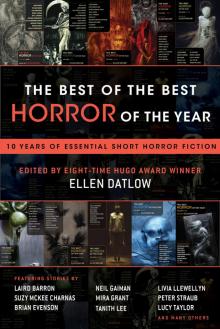 The Best of the Best Horror of the Year
The Best of the Best Horror of the Year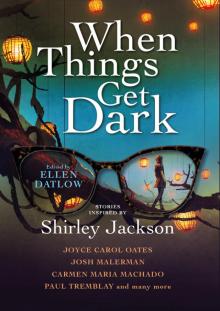 When Things Get Dark
When Things Get Dark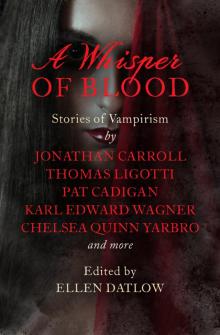 A Whisper of Blood
A Whisper of Blood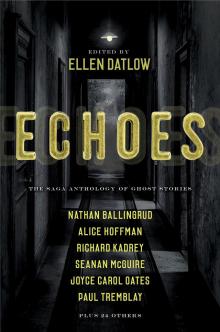 Echoes
Echoes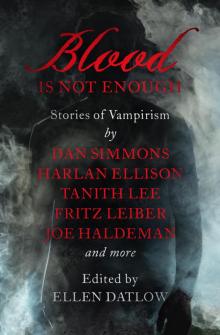 Blood Is Not Enough
Blood Is Not Enough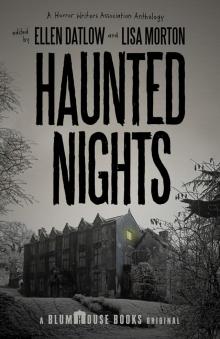 Haunted Nights
Haunted Nights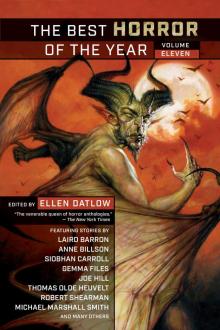 The Best Horror of the Year Volume Eleven
The Best Horror of the Year Volume Eleven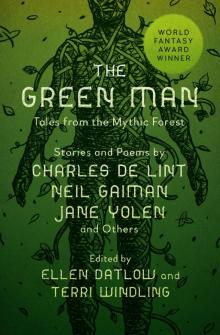 The Green Man
The Green Man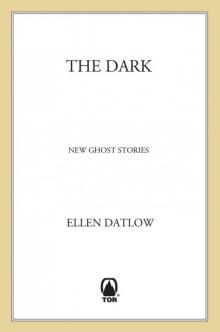 The Dark
The Dark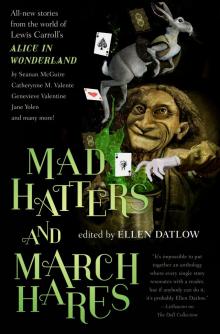 Mad Hatters and March Hares
Mad Hatters and March Hares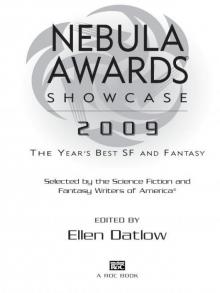 Nebula Awards Showcase 2009
Nebula Awards Showcase 2009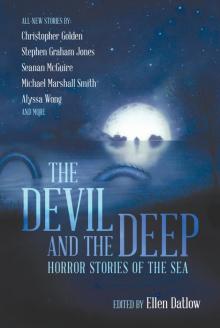 The Devil and the Deep
The Devil and the Deep